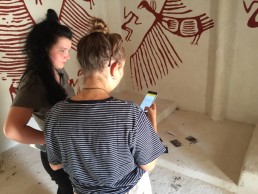CAA International Conference in Kraków, Poland, 23-27 April, 2019
· Are you designing digital resources for different archaeological users – specialists and wider audiences alike?
· Do you deploy – or do you want to deploy – methods from the UX (user experience) and participatory design fields?
· What workflows do you follow in iteratively developing your digital outputs? How are end users and stakeholders involved throughout these workflows?
· What evaluation methodologies are you using to assess the successes and failures of your digital work with diverse audiences?Please join us to explore these questions (and more!) in our Roundtable Session #S36 on User Experience Design in Archaeology & Cultural Heritage at the CAA International Conference in Kraków, Poland, 23-27 April, 2019.We welcome all contributors who are working to integrate archaeological/heritage data and digital platforms into experiences that are truly tailored to the needs and expectations of their users.We seek to discuss your iterative methodologies, your users’ experiences, and your lessons-learned in order to refine user experience design models & toolkits for the archaeology and heritage sector.
The full abstract for our session is pasted below. This is a discussion-focused session and papers should be ‘flash’ in nature – i.e., no more than 10 minutes – and will be pre-circulated to allow us to delve into specifics during moderated discussion periods.
Deadline for submission of abstracts is Wednesday 10 October 2018.
To apply: Submit an abstract of no more than 250 words, excluding session title, author names, affiliations, and email addresses as well as 3 – 5 keywords. Please go to the CAA conference website (https://ocs.
This roundtable is part of the EU COST ACTION network ARKWORK: https://www.arkwork.
We hope you can join us!
User Experience Design in Archaeology and Cultural Heritage (CAA conference, Session 36)
Francesca Dolcetti (University of York)
Rachel Opitz (University of Glasgow)
Sara Perry (University of York)
Despite the widespread dissemination of digital tools and applications in both archaeology and heritage, relatively little is known about their real effectiveness and impact on diverse audiences (specialists and lay publics alike). A new iterative design workflow, involving end users and stakeholders from the outset, as well as an accompanying design evaluation methodology, may open new avenues for engagement while, at once, constructively influencing our research objectives and epistemologies.
In this Roundtable session, we seek to bring together a multidisciplinary group looking at different aspects of archaeological knowledge production to discuss theoretical and methodological issues in the field of participatory design and user experience, and to foster a critical understanding of how this knowledge is used and its social impact. Our aim is to convene researchers and practitioners in a dialogue that is focused on examples of interdisciplinary co-creation and user testing of Augmented, Virtual and Mixed Realities (AR, VR, and MR) and related digitally-mediated experiences for museums, archaeological and cultural heritage sites, and varied teaching and research contexts. We are particularly interested in practical experiences around how to integrate archaeological data, storytelling and digital platforms to create experiences truly tailored to the needs and expectations of users.
The format of this Roundtable is a series of flash position papers (10 minutes maximum) followed by periods of moderated discussion. The session concludes with an open floor discussion and a wrap-up report summarising the discussion and suggesting follow-up activities. Position papers will be submitted in advance to the session chairs and shared with all panelists. The session welcomes participants from different sectors including but not limited to digital humanities, archaeology, museology, design research and Human-Computer Interaction (HCI).

